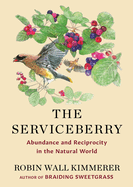 The Serviceberry: Abundance and Reciprocity in the Natural World
The Serviceberry: Abundance and Reciprocity in the Natural World
Robin Wall Kimmerer
Scribner
As Indigenous scientist and author of Braiding Sweetgrass Robin Wall Kimmerer harvests serviceberries alongside the birds, she considers the ethic of reciprocity that lies at the heart of the gift economy. How, she asks, can we learn from Indigenous wisdom and the plant world to reimagine what we value most? Our economy is rooted in scarcity, competition, and the hoarding of resources, and we have surrendered our values to a system that actively harms what we love. Meanwhile, the serviceberry’s relationship with the natural world is an embodiment of reciprocity, interconnectedness, and gratitude. The tree distributes its wealth–its abundance of sweet, juicy berries–to meet the needs of its natural community. And this distribution ensures its own survival. As Kimmerer explains, “Serviceberries show us another model, one based upon reciprocity, where wealth comes from the quality of your relationships, not from the illusion of self-sufficiency.”
As Elizabeth Gilbert writes, Robin Wall Kimmerer is “a great teacher, and her words are a hymn of love to the world.” The Serviceberry is an antidote to the broken relationships and misguided goals of our times, and a reminder that “hoarding won’t save us, all flourishing is mutual.”
 James
James
Percival Everett
Doubleday Books
When the enslaved Jim overhears that he is about to be sold to a man in New Orleans, separated from his wife and daughter forever, he decides to hide on nearby Jackson Island until he can formulate a plan. Meanwhile, Huck Finn has faked his own death to escape his violent father, recently returned to town. As all readers of American literature know, thus begins the dangerous and transcendent journey by raft down the Mississippi River toward the elusive and too-often-unreliable promise of the Free States and beyond.
While many narrative set pieces of Adventures of Huckleberry Finn remain in place (floods and storms, stumbling across both unexpected death and unexpected treasure in the myriad stopping points along the river’s banks, encountering the scam artists posing as the Duke and Dauphin…), Jim’s agency, intelligence and compassion are shown in a radically new light.
Brimming with the electrifying humor and lacerating observations that have made Everett a “literary icon” ( Oprah Daily), and one of the most decorated writers of our lifetime, James is destined to be a cornerstone of twenty-first century American literature.
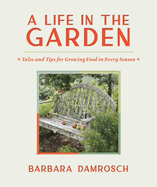 A Life in the Garden: Tales & Tips for Growing Food in Every Season
A Life in the Garden: Tales & Tips for Growing Food in Every Season
Barbara Damrosch
Timber Press
In A Life in the Garden, horticultural icon Barbara Damrosch imparts a lifetime of wisdom on growing food for herself and her family. In writing that’s accessible, engaging, and elegant, she welcomes us to garden alongside her. Personal, thoughtful, and often humorous, this book offers practical DIY insights that will delight gardeners, cooks, and small-scale farmers. With a personal and sometimes irreverent tone, Barbara expresses the pleasure she takes in gardening, the sense of empowerment she finds in it, and the importance of a partnership with the real expert: nature.
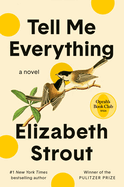 Tell Me Everything
Tell Me Everything
Elizabeth Strout
Random House
With her remarkable insight into the human condition and silences that contain multitudes, Elizabeth Strout returns to the town of Crosby, Maine, and to her beloved cast of characters–Lucy Barton, Olive Kitteridge, Bob Burgess, and more–as they deal with a shocking crime in their midst, fall in love and yet choose to be apart, and grapple with the question, as Lucy Barton puts it, “What does anyone’s life mean?”
It’s autumn in Maine, and the town lawyer Bob Burgess has become enmeshed in an unfolding murder investigation, defending a lonely, isolated man accused of killing his mother. He has also fallen into a deep and abiding friendship with the acclaimed writer Lucy Barton, who lives down the road in a house by the sea with her ex-husband, William. Together, Lucy and Bob go on walks and talk about their lives, their fears and regrets, and what might have been. Lucy, meanwhile, is finally introduced to the iconic Olive Kitteridge, now living in a retirement community on the edge of town. They spend afternoons together in Olive’s apartment, telling each other stories. Stories about people they have known–“unrecorded lives,” Olive calls them–reanimating them, and, in the process, imbuing their lives with meaning.
Brimming with empathy and pathos, Tell Me Everything is Elizabeth Strout operating at the height of her powers, illuminating the ways in which our relationships keep us afloat. As Lucy says, “Love comes in so many different forms, but it is always love.”
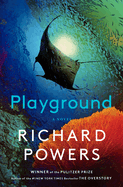 Playground
Playground
Richard Powers
W.W. Norton & Company
Four lives are drawn together in a sweeping, panoramic new novel from Richard Powers, showcasing the Pulitzer Prize-winning author of The Overstory at the height of his skills. Twelve-year-old Evie Beaulieu sinks to the bottom of a swimming pool in Montreal strapped to one of the world’s first aqualungs. Ina Aroita grows up on naval bases across the Pacific with art as her only home. Two polar opposites at an elite Chicago high school bond over a three-thousand-year-old board game; Rafi Young will get lost in literature, while Todd Keane’s work will lead to a startling AI breakthrough.
They meet on the history-scarred island of Makatea in French Polynesia, whose deposits of phosphorus once helped to feed the world. Now the tiny atoll has been chosen for humanity’s next adventure: a plan to send floating, autonomous cities out onto the open sea. But first, the island’s residents must vote to greenlight the project or turn the seasteaders away.
Set in the world’s largest ocean, this awe-filled book explores that last wild place we have yet to colonize in a still-unfolding oceanic game, and interweaves beautiful writing, rich characterization, profound themes of technology and the environment, and a deep exploration of our shared humanity in a way only Richard Powers can.
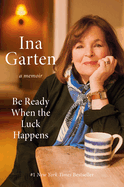 Be Ready When the Luck Happens
Be Ready When the Luck Happens
Ina Garten
Crown
Here, for the first time, Ina Garten presents an intimate, entertaining, and inspiring account of her remarkable journey. Ina’s gift is to make everything look easy, yet all her accomplishments have been the result of hard work, audacious choices, and exquisite attention to detail. In her unmistakable voice (no one tells a story like Ina), she brings her past and her process to life in a high-spirited and no-holds-barred memoir that chronicles decades of personal challenges, adventures (and misadventures) and unexpected career twists, all delivered with her signature combination of playfulness and purpose.
From a difficult childhood to meeting the love of her life, Jeffrey, and marrying him while still in college, from a boring bureaucratic job in Washington, D.C., to answering an ad for a specialty food store in the Hamptons, from the owner of one Barefoot Contessa shop to author of bestselling cookbooks and celebrated television host, Ina has blazed her own trail and, in the meantime, taught millions of people how to cook and entertain. Now, she invites them to come closer to experience her story in vivid detail and to share the important life lessons she learned along the way: do what you love because if you love it you’ll be really good at it, swing for the fences, and always Be Ready When the Luck Happens.
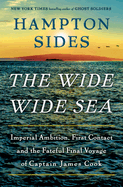 The Wide Wide Sea: Imperial Ambition, First Contact and the Fateful Final Voyage of Captain James Cook
The Wide Wide Sea: Imperial Ambition, First Contact and the Fateful Final Voyage of Captain James Cook
Hampton Side
Doubleday Books
On July 12th, 1776, Captain James Cook, already lionized as the greatest explorer in British history, set off on his third voyage in his ship the HMS Resolution. Two-and-a-half years later, on a beach on the island of Hawaii, Cook was killed in a conflict with native Hawaiians. How did Cook, who was unique among captains for his respect for Indigenous peoples and cultures, come to that fatal moment?
Hampton Sides’ bravura account of Cook’s last journey both wrestles with Cook’s legacy and provides a thrilling narrative of the titanic efforts and continual danger that characterized exploration in the 1700s. Cook was renowned for his peerless seamanship, his humane leadership, and his dedication to science–the famed naturalist Joseph Banks accompanied him on his first voyage, and Cook has been called one of the most important figures of the Age of Enlightenment. He was also deeply interested in the native people he encountered. In fact, his stated mission was to return a Tahitian man, Mai, who had become the toast of London, to his home islands. On previous expeditions, Cook mapped huge swaths of the Pacific, including the east coast of Australia, and initiated first European contact with numerous peoples. He treated his crew well, and endeavored to learn about the societies he encountered with curiosity and without judgment.
Yet something was different on this last voyage. Cook became mercurial, resorting to the lash to enforce discipline, and led his two vessels into danger time and again. Uncharacteristically, he ordered violent retaliation for perceived theft on the part of native peoples. This may have had something to do with his secret orders, which were to chart and claim lands before Britain’s imperial rivals could, and to discover the fabled Northwest Passage. Whatever Cook’s intentions, his scientific efforts were the sharp edge of the colonial sword, and the ultimate effects of first contact were catastrophic for Indigenous people around the world. The tensions between Cook’s overt and covert missions came to a head on the shores of Hawaii. His first landing there was harmonious, but when Cook returned after mapping the coast of the Pacific Northwest and Alaska, his exploitative treatment of the Hawaiians led to the fatal encounter.
At once a ferociously-paced story of adventure on the high seas and a searching examination of the complexities and consequences of the Age of Exploration, THE WIDE WIDE SEA is a major work from one of our finest narrative nonfiction writers.
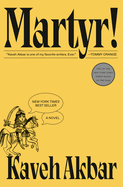 Martyr!
Martyr!
Kaveh Akbar
Knopf
Cyrus Shams is a young man grappling with an inheritance of violence and loss: his mother’s plane was shot down over the skies of the Persian Gulf in a senseless accident; and his father’s life in America was circumscribed by his work killing chickens at a factory farm in the Midwest. Cyrus is a drunk, an addict, and a poet, whose obsession with martyrs leads him to examine the mysteries of his past–toward an uncle who rode through Iranian battlefields dressed as the angel of death to inspire and comfort the dying, and toward his mother, through a painting discovered in a Brooklyn art gallery that suggests she may not have been who or what she seemed.
Kaveh Akbar’s Martyr! is a paean to how we spend our lives seeking meaning–in faith, art, ourselves, others.
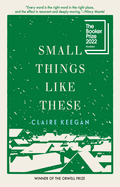 Small Things Like These
Small Things Like These
Claire Keegan
Grove Press
It is 1985 in a small Irish town. During the weeks leading up to Christmas, Bill Furlong, a coal merchant and family man faces into his busiest season. Early one morning, while delivering an order to the local convent, Bill makes a discovery which forces him to confront both his past and the complicit silences of a town controlled by the church.
An international bestseller, Small Things Like These is a deeply affecting story of hope, quiet heroism, and empathy from one of our most critically lauded and iconic writers.
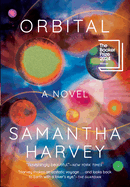 Orbital
Orbital
Samantha Harvey
Atlantic Monthly Press
A slender novel of epic power and the winner of the Booker Prize 2024, Orbital deftly snapshots one day in the lives of six women and men traveling through space. Selected for one of the last space station missions of its kind before the program is dismantled, these astronauts and cosmonauts–from America, Russia, Italy, Britain, and Japan–have left their lives behind to travel at a speed of over seventeen thousand miles an hour as the earth reels below. We glimpse moments of their earthly lives through brief communications with family, their photos and talismans; we watch them whip up dehydrated meals, float in gravity-free sleep, and exercise in regimented routines to prevent atrophying muscles; we witness them form bonds that will stand between them and utter solitude. Most of all, we are with them as they behold and record their silent blue planet. Their experiences of sixteen sunrises and sunsets and the bright, blinking constellations of the galaxy are at once breathtakingly awesome and surprisingly intimate.
Profound and contemplative, Orbital is a moving elegy to our environment and planet.
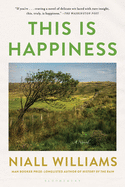 This Is Happiness
This Is Happiness
Niall Williams
Bloomsbury Publishing
You don’t see rain stop, but you sense it. You sense something has changed in the frequency you’ve been living and you hear the quietness you thought was silence get quieter still, and you raise your head so your eyes can make sense of what your ears have already told you, which at first is only: something has changed.
The rain is stopping. Nobody in the small, forgotten village of Faha remembers when it started; rain on the western seaboard was a condition of living. Now–just as Father Coffey proclaims the coming of electricity–it is stopping. Seventeen-year-old Noel Crowe is standing outside his grandparents’ house shortly after the rain has stopped when he encounters Christy for the first time. Though he can’t explain it, Noel knows right then: something has changed.
This is the story of all that was to follow: Christy’s long-lost love and why he had come to Faha, Noel’s own experiences falling in and out of love, and the endlessly postponed arrival of electricity–a development that, once complete, would leave behind a world that had not changed for centuries.
Niall Williams’ latest novel is an intricately observed portrait of a community, its idiosyncrasies and its traditions, its paradoxes and its inanities, its failures and its triumphs. Luminous and otherworldly, and yet anchored with deep-running roots into the earthy and the everyday, This Is Happiness is about stories as the very stuff of life: the ways they make the texture and matter of our world, and the ways they write and rewrite us.